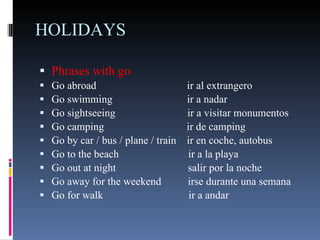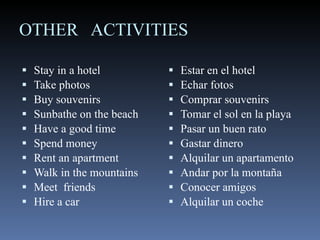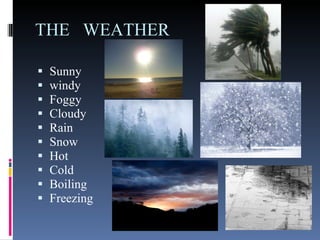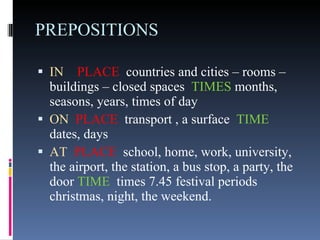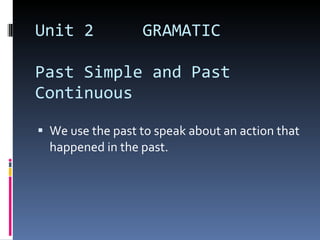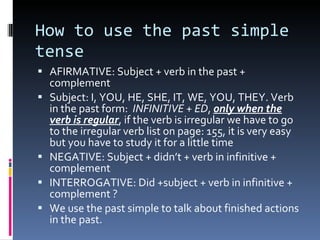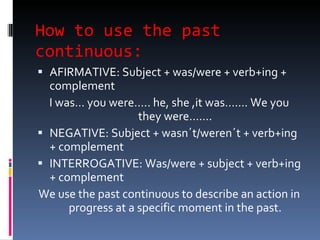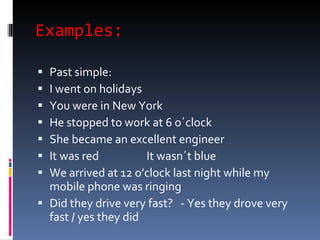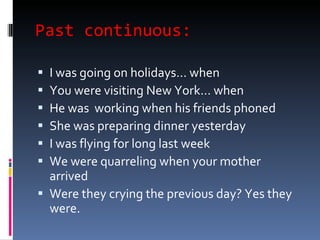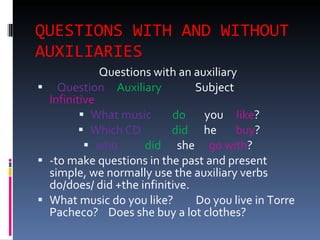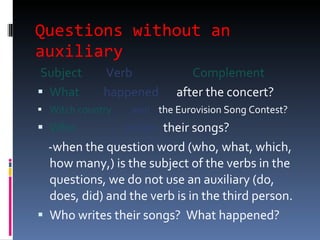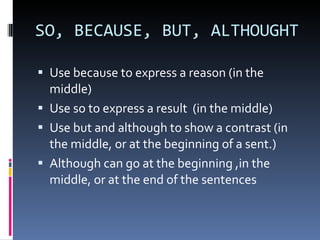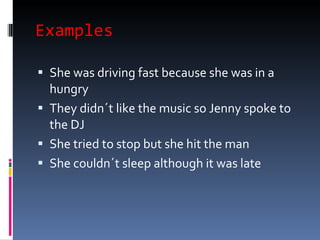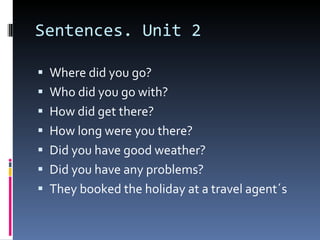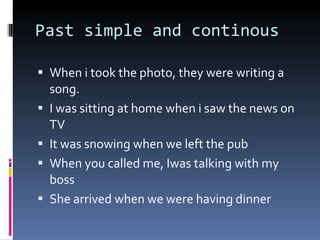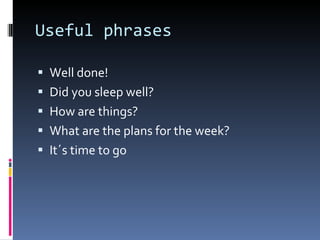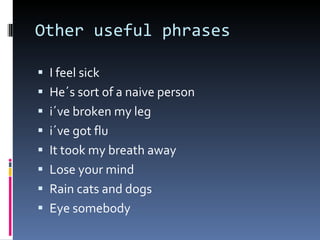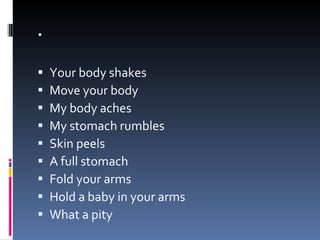Project unit 2 corrected
- 2. HOLIDAYS Phrases with go Go abroad ir al extrangero Go swimming ir a nadar Go sightseeing ir a visitar monumentos Go camping ir de camping Go by car / bus / plane / train ir en coche, autobus Go to the beach ir a la playa Go out at night salir por la noche Go away for the weekend irse durante una semana Go for walk ir a andar
- 3. OTHER ACTIVITIES Stay in a hotel Take photos Buy souvenirs Sunbathe on the beach Have a good time Spend money Rent an apartment Walk in the mountains Meet friends Hire a car Estar en el hotel Echar fotos Comprar souvenirs Tomar el sol en la playa Pasar un buen rato Gastar dinero Alquilar un apartamento Andar por la montaña Conocer amigos Alquilar un coche
- 4. THE WEATHER Sunny windy Foggy Cloudy Rain Snow Hot Cold Boiling Freezing
- 5. PREPOSITIONS IN PLACE countries and cities – rooms – buildings – closed spaces TIMES months, seasons, years, times of day ON PLACE transport , a surface TIME dates, days AT PLACE school, home, work, university, the airport, the station, a bus stop, a party, the door TIME times 7.45 festival periods christmas, night, the weekend.
- 6. Unit 2 GRAMATIC Past Simple and Past Continuous We use the past to speak about an action that happened in the past.
- 7. How to use the past simple tense AFIRMATIVE: Subject + verb in the past + complement Subject: I, YOU, HE, SHE, IT, WE, YOU, THEY. Verb in the past form: INFINITIVE + ED , only when the verb is regular , if the verb is irregular we have to go to the irregular verb list on page: 155, it is very easy but you have to study it for a little time NEGATIVE: Subject + didn’t + verb in infinitive + complement INTERROGATIVE: Did +subject + verb in infinitive + complement ? We use the past simple to talk about finished actions in the past.
- 8. How to use the past continuous: AFIRMATIVE: Subject + was/were + verb+ing + complement I was… you were….. he, she ,it was……. We you they were……. NEGATIVE: Subject + wasn´t/weren´t + verb+ing + complement INTERROGATIVE: Was/were + subject + verb+ing + complement We use the past continuous to describe an action in progress at a specific moment in the past.
- 9. Examples: Past simple: I went on holidays You were in New York He stopped to work at 6 o´clock She became an excellent engineer It was red It wasn´t blue We arrived at 12 o’clock last night while my mobile phone was ringing Did they drive very fast? - Yes they drove very fast / yes they did
- 10. Past continuous: I was going on holidays… when You were visiting New York… when He was working when his friends phoned She was preparing dinner yesterday I was flying for long last week We were quarreling when your mother arrived Were they crying the previous day? Yes they were.
- 11. QUESTIONS WITH AND WITHOUT AUXILIARIES Questions with an auxiliary Question Auxiliary Subject Infinitive What music do you like ? Which CD did he buy ? who did she go with ?  -to make questions in the past and present simple, we normally use the auxiliary verbs do/does/ did +the infinitive. What music do you like? Do you live in Torre Pacheco? Does she buy a lot clothes?
- 12. Questions without an auxiliary Subject Verb Complement What happened after the concert? Witch country won the Eurovision Song Contest? Who writes their songs? -when the question word (who, what, which, how many,) is the subject of the verbs in the questions, we do not use an auxiliary (do, does, did) and the verb is in the third person. Who writes their songs? What happened?
- 13. SO, BECAUSE, BUT, ALTHOUGHT Use because to express a reason (in the middle) Use so to express a result (in the middle) Use but and although to show a contrast (in the middle, or at the beginning of a sent.) Although can go at the beginning ,in the middle, or at the end of the sentences
- 14. Examples She was driving fast because she was in a hungry They didn´t like the music so Jenny spoke to the DJ She tried to stop but she hit the man She couldn´t sleep although it was late
- 15. Sentences. Unit 2 Where did you go? Who did you go with? How did get there? How long were you there? Did you have good weather? Did you have any problems? They booked the holiday at a travel agent´s
- 16. Past simple and continous When i took the photo, they were writing a song. I was sitting at home when i saw the news on TV It was snowing when we left the pub When you called me, Iwas talking with my boss She arrived when we were having dinner
- 17. Useful phrases Well done! Did you sleep well? How are things? What are the plans for the week? It´s time to go
- 18. Other useful phrases I feel sick He´s sort of a naive person i´ve broken my leg i´ve got flu It took my breath away Lose your mind Rain cats and dogs Eye somebody
- 19. . Your body shakes Move your body My body aches My stomach rumbles Skin peels A full stomach Fold your arms Hold a baby in your arms What a pity

